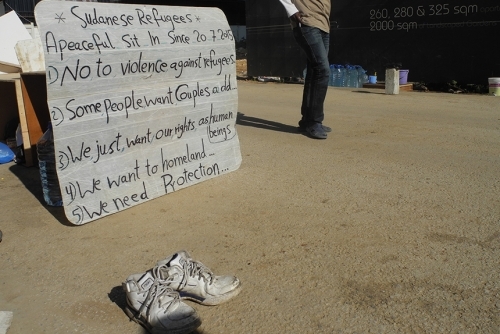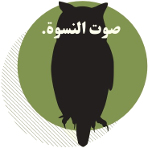
On December 3rd 2015, an info session organized by Anti-Racism Movement (ARM) took place in Dammeh on the situation of Sudanese protests in Lebanon. The speakers were Sudanese protesters and representatives from ANJO, 'a group established to support Sudanese refugees in Lebanon on the humanitarian and legal levels, until they re-settle in third countries where there is respect for their human dignity, and human rights'. Speakers discussed the situation of Sudanese refugees and asylum seekers in Lebanon. This document summarizes the main issues raised during the discussion, the demands of the protesters and ways to show support and solidarity.
Some major points raised during the discussion:
- There are around 800 Sudanese refugee and asylum seeker in Lebanon.
- Sudanese asylum seekers sometimes have to wait in Lebanon for two years until they know if they are offered a refugee status of not. Asylum seekers are not provided with services or protection from UNHCR in this very long process of waiting for the application file to be completed. Most of those who have been offered refugee status have not be resettled in a host country yet and while they are acknowledged as refugees, their host country is still unknown. Additionally, many of the refugee application files have been “closed” by UNHCR staff, sometimes as a way to threaten protesters, other times for no clear reason. Discussants also mentioned that many of the files have been closed because of UNHCR staff’s incompetence and ignorance of the geographic locations and areas of Sudan so they many times misspell or mistake the names of the cities for something else, then it is later claimed that the asylum seeker did not provide honest information. Both refugees and asylum seekers cannot afford to have residency papers in Lebanon so they cannot work legally and end up being exploited as cheap labor. Moreover, without residency papers, Sudanese children cannot have access to education and schools.
- Speakers talked about forms of coordination between the Lebanese general security, the Sudanese embassy and UNHCR in the issue of Sudanese refugees: recently, five Sudanese refugees were forcibly returned to Sudanese by the Lebanese police. This is highly problematic and a violation of human rights since these refugees have fled their country due to political reasons and social unrest. Forcibly returning them to Sudan puts them at risk for torture and violence and detention. UNHCR claims it does not have any knowledge of this and did not offer protection.
- Speakers wondered why was UNHCR staff were telling some Sudanese refugees that they will be resettled as refugees in Lebanon, knowing that
Lebanon is legally not an asylum country that receives refugees
- Sudanese refugees and asylum seekers are exposed to daily racism in Lebanon, from the service provider who is supposed to provide services with respect, to the hassles of working and renting in Lebanon, to UNHCR officers
- UNHCR and the NGO contracted with UNHCR to provide services and aid for Sudanese refugees claim that they treats all refugees equally but they discriminate based on race, gender and nationality. Also, UNHCR and NGO service providers “favor” some Sudanese, using them to get and collect information about the other refugees.
Sudanese protesters’ demands
- That UNHCR to re-open all the refugee application files without discrimination.
- That UNHCR treat all refugees and asylum seekers equally, without discrimination based on race, gender or nationality
- Sudanese asylum seekers and refugees have every right to protest for the human rights and for their demands. Protesters should not be threatened with their legal refugee papers or with lesser services because they are protesting, and should not be bullied by UNHCR security guards or Lebanese police.
- That UNHCR open an investigation into incidences of violence against the protesters that happened in 10/10/15 by UNHCR security guards and hold staff accountable for discrimination and mistreatment of Sudanese refugees
- That a committee be set to represent the Sudanese asylum seekers and refugees and their demands, and to defend their rights
- That the general security stop forcibly making refugees and asylum seekers return to Sudan and that UNHCR help protect and prevent this from happening and work towards protecting refugees detained by police in prisons and police stations.
How can we show solidarity?
- Solidarity action: Sudanese protesters need a solidarity action to support their protest and their rights, especially that they have been getting a lot of threat these days
- Legal activism: Protesters need various legal consultations from human rights lawyers
- Media pressure: Sudanese protesters need media mobilization to highlight their cause and demands.
Publisher:
Section:
Category:






